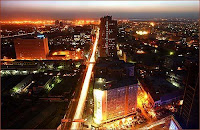Death Note from Pakistan...Death Note from me and Death Note from you as well...You can also call it a condolence message sent from a dead to itself....You may not like it (infarct you definitely won't like it) but You can't avoid it either...We have been in a state of denial for not just past 70 years....that is belittling the history...we the residents of region called Sindh (Indus...yes I buy that ideology that we are Indus people not Indian people) have been in this state of denial for centuries...But someone has to talk and we need to do a lot of honest straight forward talking amongst ourselves if we want a true Pakistan for ourselves and our children. We need a constructive dialogue and a new social contract...so here goes my death note...
Sialkot brothers was a big news and then we agreed that it was totally fine to kill the way they were killed because they were supposedly murderers...For us...Salman Taseer murder was a big news and then it was totally fine to kill him the way he was killed because he was supposedly blasphemer.......Innocent girls and boys in Jamia Hafsa complex first indoctrinated in absurdly wrong interpretation of religion by one and then murdered in the name of national security by other and what happened to any of those culprits? So many killed by militants in the name of religion in Swat and then so many murdered extra judiciously in the name of national interest...How many dead bodies recovered from Green Chowk of Swat but just a news for us...a means to spend our evening busy lamenting others so that our own faces remain hidden...., Kharootabad, Baluchistan, Lahore, Karachi everywhere.......So many innocents murdered in the name of religion and retaliation against injustice in suicide bombings and blasts and it was just a news for us...So many killed in the name of national interest, international brotherhood, classified operations etc and it was just a news happening far away from us...for us same story happened everywhere...it has always been the same...a good news...an excellent story for our greedy ears...a means to keep our evenings busy.....a means to hide our ugly face behind corrupt politicians and generals....we ourselves remained the same corrupt, dishonest, dual thinking, hypocrite, trigger happy, conspiracy loving people always blaming others....have we ever thought that no matter how cruel and callous any other is...how big an enemy of ourselves we have become?
Have we ever realized that we as a nation are so corrupt, insensitive and hypocritical that perhaps we are nothing but a source of embarrassment both for our religion and our national founders? Have we ever realized that these politicians, these bureaucrats, these generals are nothing but a mirror of us and are treating us this way only because we can't stop them? We can't stop them not because we are not strong....but because we ourselves are equally corrupt? Shall we ever realize that change doesn't come from top? Whenever, we try to bring change from top, it is just momentarily (even if it comes) and nothing more than charisma? Shall we ever understand that only lasting change will come from within us? It will come from bottom and it will only come if we start facing the truth with honesty. Shall we ever realize that we have been left with very small time to correct ourselves? We have lived as National Security state, Guardian of Islam and caretaker of interests of superpowers for decades...Isn't it the time that we need to transform into a social security state...A state not asking for people to withstand it...A state helping people to withstand their lives with honor and dignity...Have we ever realized that this state did not become a national security state by itself? We, the people made it so instead of a social security state. We desperately loved to teach everyone in the world a lesson and see what we have done with ourselves?
Shall we ever learn that history doesn't remember perished nations by the deeds of their corrupt leaders? The history remembers perished nations just as perished nations....It is our destiny after all...and it definitely can't be made by the way we are trying to build it.
And finally...about the question "Then what is the solution?"...Please don't do this to yourselves....You know the solutions and solutions are not french revolution or Chinese revolution or this and that revolution...You know the solution...do you have the courage to adopt it as well? Difficult question to ask as it requires action from 180 million people...not to change governments but to change ourselves
























